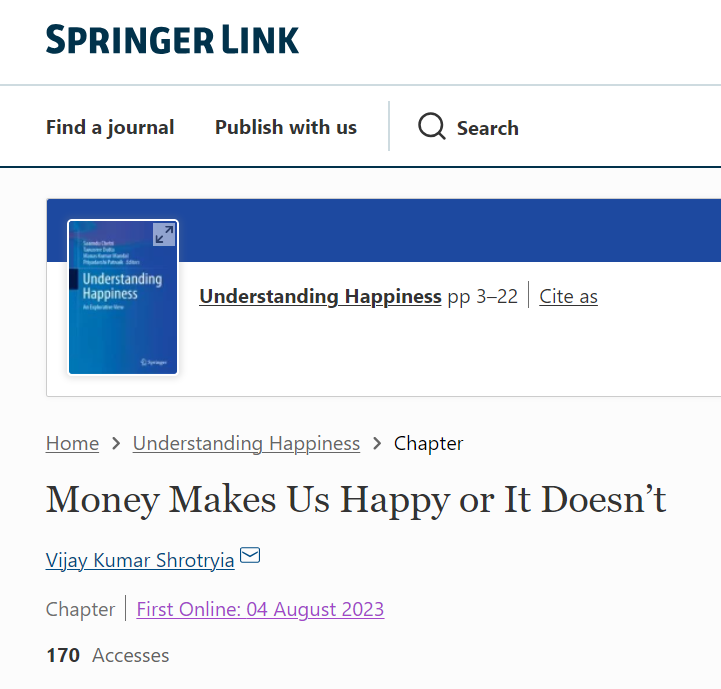The dominance of market forces in the given conditions of capitalism is converting all subjective measures into objective ones and all intangible values into materiality and tangible indicators. Money, which is translated through income measures, is driving the modern-day materialistic world that we are living in. The consumerism of today is focusing on the so-called possibilities of tomorrow in such a way that it seems imaginary to think of an acceptable alternative.
Majorly it is believed that higher level of income expands the bouquet of choices, allowing freedom to citizens. This belief leads to an expected policy framework by the state for creation of opportunities which could be capitalized by the people. Such conversion of opportunities into expanded earning avenues draws positive emotion among the citizens because it improves their income levels. Money or income is considered to be a means of deriving pleasure of life and having a comfortable living. The evolution of money is relatively an invention of recent times. Yet, it has been able to histrionically transform humanity.
The invention or creation of money did not happen through a technological breakthrough of any kind, rather it originated as a convenient measure, or was a mental revolution to convert matter into mind. According to Tool/Drug theory, money is used as an instrument to obtain certain commodities (tool theory) and is considered to exert action at a neurochemical level to produce reinforcing effects (drug theory).
These metaphors of ‘tool’ and ‘drug’ guide us to see different roles that money plays. As a tool, it is a mean to an end; as a drug, it is a reward for efforts. Money is found to be affecting human mind, brain, and behaviour, which is the cause of motivation (reward) to earn more. Money has semiotic and psychological influence on individuals for its acquisition, possession, and expense. An expected value that gets served through spending certain amounts of money drives the sense of perceived satisfaction leading towards feeling good.
It is purely relative as to how much money is sufficient and to what time it shall keep maintaining that sense. Money keeps changing its role from permanent to temporary state depending on situation, individual and time.
Money is considered to be a mean to the end of leading a good or a happy life as reflected through ‘Tool Theory’. It solves many problems but if it is considered and used as a solution to every kind of problem, it spoils life and becomes the problem itself; it disturbs peace and adds to relational problems. The price of money becomes so heavy on individuals that it leads to acute intrapersonal conflict leading towards alcoholism and drugs.
Money assures independence and broadens the scope of power and control. Money helps in performing objective functions of individuals helping them buy goods and services. It is viewed as a utilitarian commodity that is ordinary, mundane, impersonal, and neutral. Money drives markets and offers choices to individuals to primarily fulfil their basic needs. Beyond that, it expands the spectrum of desires and achieving higher targets.
In the long run, it dispels the belief of satisfaction with fulfilling needs and aspirations and keeps driving individuals to earn more. (The relationship between satisfaction and happiness is outlined in one of my earlier posts). Through money one gets to enjoy the control over the expected outcomes. Market functions on the principles of demand, supply, and circulation of money; the more the money changes hands, the more it gets multiplied and the deeper it penetrates into the psyche increasing the urge for more. This state takes one away from being mindful of the fact that the future one is visualizing, may not ever provide those comforts that are available or valuable today.
Our thinking is transformed by the obsessiveness by which we tend to view money and it disturbs life in such a way that the so-called comfort, pleasure, and feeling of happiness and joy is taken far away where mindfulness gets surrendered. That is the dark side of money. We do not trust the stranger or our next-door neighbour but we trust the coin they hold. (Some of my writings on happiness are available on my blog).
We keep running on the treadmill without reaching anywhere, the more we run, the more we target to run further, but we don’t reach anywhere, our state changes a bit but our place remain the same.
We need to be mindful. The wants have to condition our mind in such a way that it derives satisfaction from what one has; satisfaction of mind is the real wealth.
The biggest challenge is to balance between the power of money and its capacity to buy (in the times of dominance of market), and be mindful. And that is what leads to happiness.
—
For more detailed discussion read –
Shrotryia, VK. (2023). Money makes us happy or it does’nt. Chapter 1 in Chetri, Dutta, Mandal, & Patnaik (Eds.) Understanding Happiness – an explorative view. SpringerNature Singapore. (pp 3-22).
